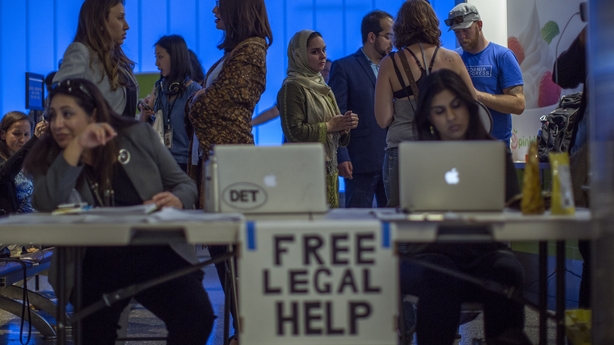US President Donald Trump called for a determined response to North Korea after talks with South Korean President Moon Jae-in today at which he emphasised the importance of their alliance but took aim at Seoul over trade and sharing the cost of defence.
Mr Trump said the United States was renegotiating what he characterised as a "rough" trade deal with South Korea agreed five years ago by his predecessor, Barack Obama.
He also reiterated that an era of "strategic patience" over North Korea's nuclear and ballistic missile programmes had ended.
"Together we are facing the threat of the reckless and brutal regime in North Korea. The nuclear and ballistic missile programmes of that regime required a determined response," Mr Trump said while standing alongside Mr Moon in the White House Rose Garden.
"We're working closely with South Korea and Japan, as well as partners around the world, on a range of diplomatic, security and economic measures to protect our allies and our own citizens from this menace known as North Korea," he said.
Mr Moon said he and Mr Trump had placed top priority on the North Korean issue and urged Pyongyang to return promptly to talks.
"President Trump and I agreed that only strong security can bring about genuine peace," Mr Moon said. "The threat and provocation of the North will be met with a stern response."
"Our two leaders will employ both sanctions and dialogue in a phased and comprehensive approach" in an effort to resolve the North Korean nuclear issue, Mr Moon added.
Both Mr Trump and Mr Moon have said they are open to renewed dialogue with North Korea, but only under the circumstances that will lead to North Korea giving up its weapons programmes.
While South Korea is a long-standing ally of the United States, Mr Trump has spoken harshly about US trade imbalances and threatened to tear up the bilateral trade pact.
"We will do more to remove barriers to reciprocal trade and market access," Mr Trump said, adding that the two leaders had talked about the thorny trade areas of steel and autos.
"I am encouraged by President Moon's assurances that he will work to create a level playing field so that American workers and businesses, and especially automakers, can have a fair shake at dealing with South Korea," he said.
US six-country travel ban takes effect
Meanwhile, Mr Trump's ban on refugees and travellers from six mainly Muslim countries came into effect overnight.
The move followed a Supreme Court decision allowing the ban to go forward following a five-month battle with rights groups.
The Trump administration said the temporary ban is necessary to block terrorists from entering the country, but immigrant advocates charge that it illegally singles out Muslims.
The 90-day ban on visitors from Iran, Libya, Somalia, Sudan, Syria and Yemen, and a 120-day ban on refugees, will allow exceptions for people with "close family relationships" in the United States.
But activists said the government has defined that too narrowly, excluding relationships with grandparents and grandchildren, aunts and uncles and others.
Many were concerned about a possibly chaotic roll-out of enforcement of the ban, like that in January when it was first announced.
Immigration rights activists and lawyers were waiting to help arrivals at New York's John F Kennedy International Airport and other airports.

The activists want to ensure that people from the six countries with valid US visas are allowed in after the ban went into effect at 1am Irish time.
The Department of Homeland Security, which was heavily criticised for mishandling many arrivals when the ban was first attempted in January, promised a smooth roll-out this time.
It stressed that anyone with a valid visa issued before the ban begins would still be admitted, and that all authorised refugees booked for travel before 6 July will also be allowed.
The Trump administration insists the ban was necessary to protect the country from terror threats, and to give immigration authorities more time to tighten vetting of travellers and refugees.
A senior administration official said: "As recent events have shown, we are living in a very dangerous time, and the US government needs every available tool to prevent terrorists from entering the country and committing acts of bloodshed and violence."

